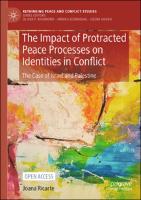The Impact of Protracted Peace Processes on Identities in Conflict
The Case of Israel and Palestine
Abstract
This open access book discusses the impact of protracted peace processes on identities in conflict. It is concerned with how lingering peace processes affect, in the long-term, patterns of othering in protracted conflicts, and how this relates with enduring violence. Taking Israel and Palestine as a case study, the book traces different representations of success and failure of the protracted peace process, as well as its associated policies, narratives, norms and practices, to analyze its impact on identity and its contribution to the maintenance and/or transformation of the cultural component of violence. On the one hand, drawing from an interdisciplinary approach comprising International Relations (IR), History and Social Psychology, this book proposes an analytical framework for assessing the specificities of the construction of identities in protracted conflicts. It identifies dehumanization and practices of reconciliation in ongoing conflicts – what is called peace-less reconciliation – as the main elements influencing processes of othering and violence in this kind of conflicts. On the other hand, the book offers an empirical historical analysis on how the protracted peace process has impacted identity building and representations made of the ‘other’ in the case of the Israeli-Palestinian conflict since the end of the 19th century to the present day.
Keywords
Protracted Conflicts; Peace Process; Identity; Dehumanization; Reconciliation; Israeli-Palestinian Conflict; Cycle of Protractedness; Israel; Palestine; Violence; Peace; Conflict; Oslo Era; British MandateDOI
10.1007/978-3-031-16567-2ISBN
9783031165672, 9783031165672Publisher
Springer NaturePublisher website
https://www.springernature.com/gp/products/booksPublication date and place
Cham, 2023Grantor
Imprint
Palgrave MacmillanSeries
Rethinking Peace and Conflict Studies,Classification
International relations
Politics and government


 Download
Download Web Shop
Web Shop